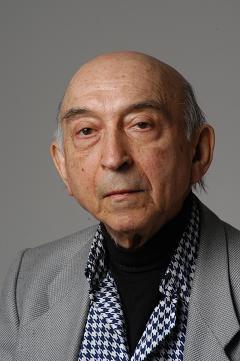
It is hard to fit the binary mind of a computer's artificial intelligence, where something is either "on" or "off," "white" or "black," "hot" or "cold," around the normal ambiguity encountered in everyday life. For example, we might all agree that it's officially "cold" outside when it gets to 40 degrees—but that doesn't mean it was "hot" at 42 degrees. Lotfi Zadeh has been called the "father of fuzzy logic" for determining a mathematical way to analyze data that doesn't neatly fit into such black/white categories. Fuzzy logic allows room for a computer to label something "somewhat cold" or "very cold"— a seemingly self-evident step considering that this is the way our brain works as well, but one that broke through the previously rigid processes of artificial intelligence. Doors opened for adaptive systems that would have been unthinkable— from email spam filters to nuclear power plant control to driver-less subway trains.
Zadeh was born in Baku, Azerbaijan and grew up in Iran. He earned his B.S.E.E. from the University of Tehran in 1942, and his M.S.E.E. from MIT in 1946. He went on to receive a Ph.D. from Columbia in 1949, where he remained on faculty until 1959, and then moved to the University of California, Berkeley where he is now a professor emeritus. He has also been director of the Berkeley Institute of Soft Computing since 1991.
Zadeh's first paper on fuzzy set theory was published in 1965. The paper set forth a methodical way to quantify terms that humans tend to experience subjectively. Coldness, darkness, and size could all now be given a number on a scale for just how cold, dark, or large they were. In 1973 he proposed his theory of fuzzy logic to work with these sets. The system itself was not "fuzzy"—indeed the system set out rigorous logic rules for how to manipulate the concepts—it was only the concepts themselves that were defined over a range of values. Zadeh's ideas were not immediately embraced. It took some two decades before the computer science field, which had been so focused on binary systems, began to pay his ideas deserved attention. Zadeh, nevertheless, continued to develop and enhance his ideas, and fuzzy logic is now widely accepted as a true paradigm shift in how to enable artificial intelligence to interact with the world just a little more like a human brain. On a practical level, fuzzy logic is incorporated into a wide spectrum of modern technology—it has been used in cruise control in cars, video camera image stabilization, improved subway trains, automatic bus and train scheduling, earthquake prediction, and even cancer diagnosis.
Zadeh's current research centers on fuzzy logic, computing with words, and soft computing—a larger system to bring together all related mathematical systems and techniques for handling uncertain information. Zadeh has received many awards, including, the Honda Prize, the IEEE Medal of Honor, the IEEE Richard Hamming medal, the ASME's Rufus Oldenburger Award, and the ACM Allen Newell Award. He is a member of the National Academy of Engineering.
Information as of April 2009

